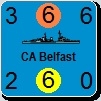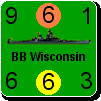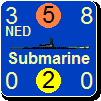AllenK
Posts: 7259
Joined: 2/17/2014
From: England
Status: offline

|
quote:
ORIGINAL: Centuur
quote:
ORIGINAL: Jagdtiger14
I like the Asian map...far more interesting!
I agree. However, I also believe that the war on Mainland Asia has changed a lot due to the unified map. I think it is easier to conquer the Chinese by Japan on this map.
It looks like that a Soviet setup which is aggresive towards Persia, allows the Japanese to start hammering on the Chinese.
So I'm still looking for a right way to play with this map, especially by the USSR...
Thanks to everyone for commenting.
The change in map scale between WiF and MWiF has certainly changed the game. In which way remains to be seen as I don't think consensus has been reached.
I think this is the first posted AAR where the USSR has invaded Manchuria so it's a bit of a unique case. It's certainly interesting and challenging for the Japanese.
From the AAR's so far posted, without USSR involvement in Manchuria, the Japs can probably hold their own, can make pretty good initial territorial gains and kill some Chinese units along the way. In return, they lose a number of units. The strategic return on investment is questionable. The Japs don't appear to have enough units to hold the gains and get captured resources back to the factories. Sooner or later, the Chinese infiltrate behind the lines, cut supply and put the Japs in trouble.
However, I think most of the AAR's have included the Additional Chinese Cities option, which was brought in to compensate for the change in map scale. In practice, it seems to advantage the Allies far more than the Axis as it gives the Chinese more primary supply sources (or potential sources if initially Japanese controlled), which aids the infiltration and more cities to place reinforcements. For the Axis it is a couple of extra hexes with the city defence bonus. It would possibly make for a more balanced game by not including it. The alternative would be some adjustments to the Japanese force pool. Initially we need to see AARs without the additional cities.
|
 Printable Version
Printable Version


























 New Messages
New Messages No New Messages
No New Messages Hot Topic w/ New Messages
Hot Topic w/ New Messages Hot Topic w/o New Messages
Hot Topic w/o New Messages Locked w/ New Messages
Locked w/ New Messages Locked w/o New Messages
Locked w/o New Messages Post New Thread
Post New Thread